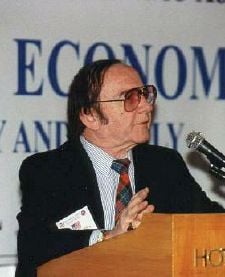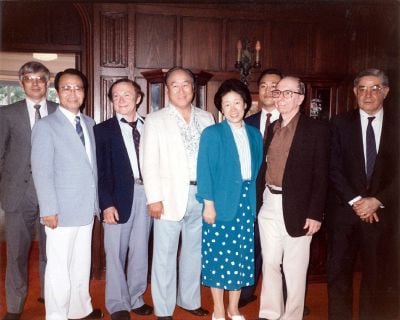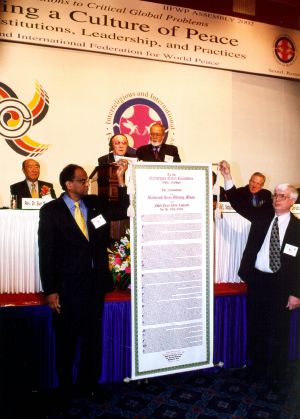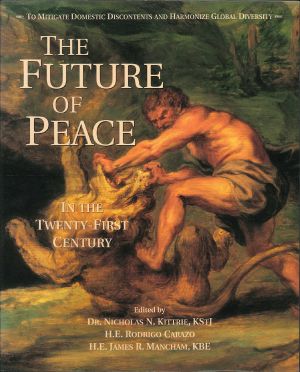Nicholas N. Kittrie
| Nicholas N. Kittrie | |
 | |
| Born | March 26, 1926 Bilgoraj, Poland |
|---|---|
| Died | December 9, 2019 Washington, DC |
| Fields | Legal scholar |
| Alma mater | University of Kansas, Georgetown University |
| Spouse | Sara (Yudovich) Kittrie |
Nicholas Nehemiah Kittrie (March 26, 1926 - December 9, 2019) was an American legal scholar. Raised in a Jewish family in Poland, he was deeply affected by the injustice of discrimination and his lifelong passion was to support the cause of righteous dissent.
He taught at American University's Washington College of Law for five decades, encouraging his students to think critically and welcome diverse viewpoints. His work was international in scope and vision, encompassing the ideals of world peace and justice to make a foundation for global harmony that guaranteed equity for all.
Life
Nicholas Nehemiah Kittrie was born Nehemiah Kronenberg in Bilgoraj, Poland, on March 26, 1926. As a young child he spent time with his uncle Leon Felhendler, who would later be known for his role in organizing the 1943 prisoner uprising at Sobibor extermination camp.
His family emigrated to pre-Israel Palestine, where as a teenager Kittrie served as a personal aide for British General Orde Wingate, a renowned World War II military leader. Wingate's Zionism and innovative, strategic brilliance was a lifelong inspiration for Kittrie.[1] Kittrie commissioned and installed a sculpture called "Rainbow in the Clouds" at Yemin Orde Youth Village in Israel, dedicated to Wingate.[2]
He attended school at the University of Cairo in 1946 and the University of London in 1947, and immigrated to the United States where he assumed the name Nicholas Kittrie. He earned LL.B. and M.A. degrees from the University of Kansas Law School in 1950, and 1951. His next move was to Chicago where he had been awarded a fellowship at the University of Chicago School of Law. He was appointed as counsel to the United States Senate Judiciary Committee, through the sponsorship of Senator Alexander Wiley to serve as Special Counsel to its Antitrust and Monopoly Subcommittee, chaired by Senator Estes Kefauver. He received his LL.M and S.J.D from Georgetown University School of Law.
He began teaching at American University's Washington College of Law (WCL) in 1963, and continued to serve there for five decades, their longest tenured professor.
Kittrie died on December 9, 2019, at a hospital in Washington DC, aged 93. He was survived by his wife Sara (Yudovich), three children (Orde Kittrie, Norda Kittrie Levin, and Zachary Kittrie), six grandchildren (Julian Levin, Jordan Levin, Ari Kittrie, Gabriella Kittrie, Theodore Kittrie, and Truman Kittrie) and two nieces (Smadar Grossman and Nitza Shaham, both of Israel).[1] A public memorial service and celebration of his life was held on January 27, 2020, at the Cosmos Club in Washington DC, where he was a member.[2]
Work
Kittrie combined the formative experiences of his youth in a Jewish family during the rise of Hitler, and mentorship by the strategic genius Orde Wingate, with his own intelligence and hard work to champion justice throughout the world. His law career was the vehicle he used to further this lifelong passion.
Professor of Law
Kittrie served as professor at American University’s Washington College of Law from 1964 to 2015, and also as Dean of the Law School from 1977 to 1980. He was a pioneer in legal education, founding the LAWCOR Program (Lawyers in Corrections) which made it possible for law students to counsel inmates in federal prison. He served as president of the American Society of Criminology (ASC) in 1975, an unusual and special honor since previous ASC presidents came from the fields of sociology and criminology rather than law.
Teaching law for half a century, Kittrie influenced the thinking of those involved in all aspects of the law. His impact spread far beyond Washington DC, as he traveled around the globe to share his expertise and insights in international and criminal law. His analyses and commentaries were published widely in the news media. He also wrote and edited more than 15 books, two of which were nominated for Pulitzer Prizes. His most cited and influential work, The Right To Be Different: Deviance and Enforced Therapy, took a multi-disciplinary approach bridging law, sociology, and psychiatry.[3]
Social Justice
Kittrie consistently championed the downtrodden, the minorities, radicals, and alternative thinkers, believing that they had the right to express their opinions whether or not they were mainstream. He defended the political offenders, the dissidents, provided they were legitimate in their dissent.[4]
He considered it important and possible to distinguish between the worthy dissenters and the unworthy terrorists and criminals, pointing to those such as Mahatma Gandhi, George Washington, Eldridge Cleaver, and Martin Luther King, Jr. who challenged authority in order to bring about social change.[5]

Kittrie worked on several United Nations commissions related to international justice and peace. He founded and chaired the Eleanor Roosevelt Institute for Justice and Peace. Eleanor Roosevelt was a well-known spokesperson for human rights, chairing the committee that drafted and approved the Universal Declaration of Human Rights. In 2014, Kittrie commissioned a portrait of Eleanor Roosevelt which he presented to the University of Bridgeport, of which he was a member of the Board of Trustees.[6]
In 1992, he and the Washington College of Law sponsored a symposium that brought together American scholars on the U.S. Constitution and others to share recommendations with constitution writers from the Republic of South Africa. This resulted in an Interim constitution in 1993 and, ultimately, the post-apartheid South African Constitution of 1994, that introduced universal adult suffrage, constitutional supremacy, and a bill of rights.
Peacemaker
More than simply seeking justice, Kittrie worked towards the goal of peace throughout the world. In this capacity he served as president of the US chapter of the Professors World Peace Academy (PWPA), and senior editor of the International Journal on World Peace. When PWPA entered into a partnership with the University of Bridgeport to create a school that could educate students for global citizenship, Kittrie became Chair of the finance committee of its Board of Trustees, serving on that board for 25 years.
In 2000, Kittrie was one of the founding leaders of the World Association of United Nations Non-Governmental Organizations (WAUNNGO), whose mission was "to promote greater cooperation, respect, and coordination among the many non-governmental organizations affiliated with the United Nations, as well as private institutions and individuals around the world who share a common vision of peace for humanity."[7] On the foundation of WAUNNGO, and with the support and vision of Reverend Sun Myung Moon, the the World Association of Non-Governmental Organizations (WANGO) came into being.

At the time of the 100th anniversary of the awarding of the first Nobel Peace Prize, Kittrie together with colleagues H.E. Rodrigo Carazo, the former president of Costa Rica, and Sir James Mancham, the founding president of Seychelles, created a major work entitled The Future of Peace in the Twenty-First Century. The subtitle of this book, "to mitigate domestic discontents and harmonize global diversity" encapsulated his focus on dissidents expanded to the international level together with the need to find harmony among diverse cultures in order to create a world of peace.[8]
Perhaps his most radical and surprising act supporting a minority controversial thinker and activist was in 2002, when Kittrie proposed nominating Rev. Moon for the Nobel Peace Prize.[9] He announced this nomination at a conference on "Creating a Culture of Peace" held in Seoul, South Korea.[10]
Legacy and Honors
Kittrie, the longest tenured professor at American University’s Washington College of Law (WCL), taught law for over 50 years to more than 10,000 law students in the nation’s capital. Far from imposing a conventional mindset, Kittrie championed independent and even unpopular thinking:
He encouraged his students to think critically and wanted them to challenge assumptions, because he was confident that they would be the leaders of tomorrow.[1]
His legacy lies not just in those he taught in Washington DC, but affected thinkers worldwide: "He was known across the globe for his original thinking and passion for justice and equity under the law.”[1]
Coming from a Jewish family, he was the last surviving family member to have known Leon Felhendler who organized the 1943 Sobibor Death Camp uprising, he lived a long and well-spent life dedicated to justice for all people:
Inspired by Felhendler, Gen. Wingate and others like them, Kittrie, throughout his career, represented the underdog, the downtrodden, minorities, revolutionaries, radicals and alternative thinkers as well as the more mainstream, whether in the court room, hearing room, or the court of public opinion.[11]
In 2015, the Washington College of Law designated him a Distinguished University Professor, the first and only in the Law School’s history, as well as Professor of Law Emeritus. He was inducted into the Founder's Circle of the Georgetown University Law Center, and was recognized as an Outstanding Career Alumni by the University of Kansas School of Law.
A prolific author, two of his books were nominated for Pulitzer Prizes. One of his edited volumes, The Tree of Liberty: A Documentary History of Rebellion and Political Crime in America (co-edited with Eldon Wedlock, Jr.) in 1986 earned the critical recognition of being "The Best Book in Law" from the Association of American Publishers.
Major works
- The Right to be Different: Deviance and Enforced Therapy. The Johns Hopkins University Press, 1972. ISBN 978-0801810527
- Crescent and Star: Arab and Israeli Perspectives on the Middle East Conflict with Yonah Alexander (eds.). AMS Press, Inc., 1973. ISBN 978-0404105228
- Medicine, Law, and Public Policy with Harold L. Hirsh and Glen Wegner (eds.). AMS Press, Inc., 1975. ISBN 978-0404104269
- Sentencing, Sanctions, and Corrections: Federal and State Law, Policy, and Practice with Elyce H. Zenoff and Vincent A. Eng. Foundation Press, 2002 (original 1981). ISBN 978-1566629706
- The Uncertain Future: Gorbachev's Eastern Bloc with Ivan Volgyes (eds.). UNKNO, 1989. ISBN 978-0943852621
- The War Against Authority: From the Crisis of Legitimacy to a New Social Contract. The Johns Hopkins University Press, 1995. ISBN 978-0801850509
- The Tree of Liberty: A Documentary History of Rebellion and Political Crime in America with Eldon D. Wedlock, Jr. (eds.). The Johns Hopkins University Press, 1998. ISBN 978-0801858116
- Rebels With A Cause: The Minds And Morality Of Political Offenders. Basic Books, 1999. ISBN 978-0813368498
- The Future of Peace in the Twenty-First Century with Rodrigo Carazo and James Mancham (eds.). Carolina Academic Press, 2003. ISBN 978-0890892114
Notes
- ↑ 1.0 1.1 1.2 1.3 Obituary: Nicholas Kittrie Dignity Memorial. Retrieved June 9, 2023.
- ↑ 2.0 2.1 ImpactIsrael represents Yemin Orde Youth Village at memorial service for the remarkable life of Dr. Nicholas N. Kittrie ImpactIsrael (January 28, 2020). Retrieved June 24, 2023.
- ↑ Nicholas N. Kittrie, The Right to be Different: Deviance and Enforced Therapy (The Johns Hopkins University Press, 1972, ISBN 978-0801810527).
- ↑ Nicholas N. Kittrie, Rebels With A Cause: The Minds And Morality Of Political Offenders (Basic Books, 1999, ISBN 978-0813368498).
- ↑ James Forman, Jr., A Little Rebellion Now and Then is a Good Thing Michigan Law Review 100(6) (2002): 1408-1420. Retrieved June 24, 2023.
- ↑ Gordon L. Anderson, Prof. Kittrie Presents Eleanor Roosevelt Portrait to University of Bridgeport Professors World Peace Academy (December 20, 2014). Retrieved June 24, 2023.
- ↑ History of WANGO: 2000 WANGO. Retrieved June 24, 2023.
- ↑ Nicholas N. Kittrie, Rodrigo Carazo, and James Mancham (eds.), The Future of Peace in the Twenty-First Century (Carolina Academic Press, 2003, ISBN 978-0890892114).
- ↑ The Nomination of the Reverend Sun Myung Moon as the Nobel Peace Prize Laureate for the Year 2002 To the Norwegian Nobel Committee, Oslo, Norway (January 25, 2002). Retrieved June 24, 2023.
- ↑ Resolution for the Nomination of Reverend Sun Myung Moon as the First Awardee of the Nobel Peace Prize on the Commencement of the Prize's Second Centenary Retrieved June 24, 2023.
- ↑ Gordon L. Anderson, Professor Nicholas N. Kittrie, International Lawyer, Educator, and Peacemaker Professors World Peace Academy (January 22, 2020). Retrieved June 10, 2023.
ReferencesISBN links support NWE through referral fees
- Capron, Alexander M. Book Review: The Right to be Different, Deviance and Enforced Therapy (Nicholas Kittrie) Columbia Law Review 73 (January 1973): 893-913. Retrieved June 24, 2023.
- Forman, James Jr. A Little Rebellion Now and Then is a Good Thing Michigan Law Review 100(6) (2002): 1408-1420. Retrieved June 24, 2023.
- Kittrie, Nicholas N. The Right to be Different: Deviance and Enforced Therapy. The Johns Hopkins University Press, 1972. ISBN 978-0801810527
- Kittrie, Nicholas N. Rebels With A Cause: The Minds And Morality Of Political Offenders. Basic Books, 1999. ISBN 978-0813368498
- Kittrie, Nicholas N., Rodrigo Carazo, and James Mancham (eds.). The Future of Peace in the Twenty-First Century. Carolina Academic Press, 2003. ISBN 978-0890892114
- Rutland, Robert A. Book review: The Tree of Liberty: A Documentary History of Rebellion and Political Crime in America. Edited by Nicholas N. Kittrie and Eldon D. Wedlock, Jr. Constitutional Commentary 5(1) (Winter 1988): 272-274. Retrieved June 24, 2023.
External links
All links retrieved June 30, 2025.
- Nicholas Kittrie C-SPAN
- Professor Nicholas N. Kittrie, International Lawyer, Educator, and Peacemaker Professors World Peace Academy
- Prof. Kittrie Presents Eleanor Roosevelt Portrait to University of Bridgeport Professors World Peace Academy
- Obituary: Nicholas Kittrie Dignity Memorial
- Nicholas Kittrie (1926–2019), Pulitzer Prize-nominated author by Linnea Crowther (December 30, 2019) Legacy.com
Credits
New World Encyclopedia writers and editors rewrote and completed the Wikipedia article in accordance with New World Encyclopedia standards. This article abides by terms of the Creative Commons CC-by-sa 3.0 License (CC-by-sa), which may be used and disseminated with proper attribution. Credit is due under the terms of this license that can reference both the New World Encyclopedia contributors and the selfless volunteer contributors of the Wikimedia Foundation. To cite this article click here for a list of acceptable citing formats.The history of earlier contributions by wikipedians is accessible to researchers here:
The history of this article since it was imported to New World Encyclopedia:
Note: Some restrictions may apply to use of individual images which are separately licensed.
